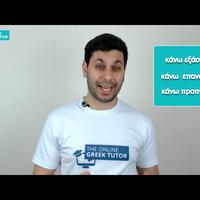Learn how to use three Greek phrases
Lernen Sie, wie man drei griechische Ausdrücke verwendet
Learn how to use three Greek phrases
Γεια σας και πάλι.
Σήμερα σε αυτό το βίντεο μάθημα θα δούμε πώς χρησιμοποιούμε τρεις φράσεις μετά από ερώτηση του μαθητή μας Jean Louis.
Today in this video lesson we will see how we use three phrases after a question from our student Jean Louis.
O μαθητής μάς ρώτησε ποια είναι η διαφορά μεταξύ των εκφράσεων «κανω εξασκηση»,
Der Student fragte uns, was der Unterschied zwischen den Ausdrücken "Ich übe",
Lo studente ci ha chiesto qual è la differenza tra le espressioni "pratico",
«κανω επαναληψη» και «κανω προπονηση». Λοιπόν, πάμε να εξηγήσουμε.
„Wiederholung machen“ und „Training machen“. Nun, lassen Sie uns erklären.
"fare ripetizione" e "fare allenamento". Bene, spieghiamo.
Θα μπορούσατε να πείτε «κάνω εξάσκηση» θέλοντας να αναφερθείτε στη δραστηριότητά σας με στόχο τη βελτίωσή σας σε κάτι.
Du könntest „Üben“ sagen, um dich auf deine Aktivität mit dem Ziel zu beziehen, in etwas besser zu werden.
Potresti dire "pratica" per riferirti alla tua attività con l'obiettivo di migliorare in qualcosa.
Για παράδειγμα, μπορείτε να πείτε «Μετά το τέλος του μαθήματος θα κάνουμε πρακτική εξάσκηση»
Du kannst zum Beispiel sagen „Nach der Stunde üben wir“
Ad esempio, puoi dire "Dopo la lezione ci eserciteremo"
ή «κάνω καθημερινή εξάσκηση των γνώσεών μου στα μαθηματικά».
oder "Ich übe mein Mathewissen jeden Tag."
o "Pratico le mie conoscenze matematiche ogni giorno".
Από την άλλη πλευρά, «κάνω επανάληψη» αναφέρεται στη διαδικασία κατά την οποία κάποιος
Andererseits bezieht sich "Wiederholen" auf den Vorgang, bei dem man
D'altra parte, "ripetizione" si riferisce al processo in cui uno
μελετάει ξανά κάποιο θέμα το οποίο κάλυψε προηγουμένως με στόχο να το μάθει καλύτερα.
greift ein zuvor behandeltes Thema mit dem Ziel auf, es besser zu lernen.
rivisita un argomento precedentemente trattato con l'obiettivo di apprenderlo meglio.
Βασικά κάποιος που «κάνει επανάληψη», μπορεί να «κάνει και εξάσκηση» την ίδια στιγμή.
Grundsätzlich kann jemand, der "probt", gleichzeitig "üben".
Fondamentalmente qualcuno che sta "provando", può "esercitarsi" allo stesso tempo.
Κάποιες φράσεις με την έκφραση «κάνω επανάληψη» είναι «ο Νίκος έχει εξετάσεις την Παρασκευή και όλη την εβδομάδα κάνει επανάληψη».
Einige Sätze mit dem Ausdruck „mach Nacharbeit“ sind „Nikos hat am Freitag eine Prüfung und er macht die ganze Woche Nacharbeit“.
Alcune frasi con l'espressione "fai revisione" sono "Nikos ha un esame venerdì e sta facendo revisione tutta la settimana".
Επίσης, μπορείτε να πείτε «Θα κάνω επανάληψη τον αόριστο γιατί τον ξέχασα».
Inoltre, puoi dire "Ripeterò l'infinito perché l'ho dimenticato".
Τέλος, η έκφραση «κάνω προπόνηση» αναφέρεται στη συστηματική σωματική προετοιμασία με στόχο τη βελτίωση
Infine, l'espressione "fare allenamento" si riferisce alla preparazione fisica sistematica con l'obiettivo del miglioramento
της φυσικής κατάστασης και τεχνικής κάποιου.
der eigenen Fitness und Technik.
della propria forma fisica e tecnica.
Για παράδειγμα, θα μπορούμε να πούμε «ο γιος μου κάθε απόγευμα έχει προπόνηση με την ομάδα ποδοσφαίρου της γειτονιάς του»
Zum Beispiel können wir sagen: „Mein Sohn trainiert jeden Nachmittag mit seiner Fußballmannschaft aus der Nachbarschaft.“
Ad esempio, potremo dire "mio figlio si allena tutti i pomeriggi con la squadra di calcio del quartiere"
ή «H προπόνηση περιλαμβάνει γυμναστική, βάρη και τρέξιμο».
oder "Das Training umfasst Gymnastik, Gewichte und Laufen."
o "L'allenamento include ginnastica ritmica, pesi e corsa".
Αυτά είχαμε για σήμερα. Ελπίζω να απαντήσαμε στην ερώτηση του Jean Louis.
Das war alles, was wir für heute hatten. Ich hoffe, wir haben die Frage von Jean Louis beantwortet.
Questo è tutto quello che avevamo per oggi. Spero che abbiamo risposto alla domanda di Jean Louis.
Μπορείτε να κάνετε και εσείς τις δικές σας ερωτήσεις και θα σας απαντήσουμε με ένα βίντεο μάθημα.
Puoi anche porre le tue domande e noi risponderemo con una video lezione.
Γράψτε και εσείς προτάσεις με τις παραπάνω εκφράσεις τα σχόλια πιο κάτω για να εξασκηθείτε στη χρήση τους.
Scrivi frasi con le espressioni di cui sopra nei commenti qui sotto per esercitarti a usarle.
Σας ευχαριστώ πολύ. Τα λέμε την επόμενη φορά. Μέχρι τότε. Γεια χαρά.
Grazie mille. Arrivederci alla prossima. Fino ad allora. Ciao bene.

